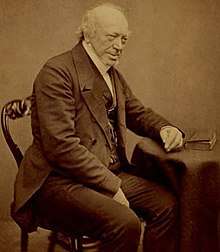Henry Padwick
Henry Padwick (1805–1879) was an English solicitor and figure of the horse racing world, known also as a moneylender, gambler and speculator.[1]

Life
He was the son of William Padwick (died 1834) of Cosham House, Hampshire. He retired from the legal profession in 1855. He became a magistrate in Middlesex and Deputy-Keeper of Holyrood Palace.[2][3]
As a solicitor in Horsham, Padwick was involved as electoral agent to William Vesey-FitzGerald in canvassing, the subject of an electoral corruption case for an 1848 by-election for Horsham.[4][5] In the 1857 general election Padwick stood unsuccessfully as a Conservative candidate at Bridgwater.[6]
Racing
Padwick employed the trainer John Barham Day from 1845 to 1855, when he was sacked after a scandal involving the Two Thousand Guineas.[7] From 1849 Padwick used "Mr. Howard" as his nom de course. In 1854 he won £80,000 on his horse Virago, losing the sum in stock market speculation.[3] In 1854, also, Padwick was co-owner with John Gully of Andover, winner of the Epsom Derby.[8]
In the aftermath of the 1855 departure from the United Kingdom of the Member of Parliament Francis Child Villiers, known as Frank, Padwick became involved in trying to clear up his heavy unpaid betting debts. To this end he was an adviser to George Child Villiers, 5th Earl of Jersey, Frank's father, and worked with Benjamin Disraeli.[3][9]
In the 1868 Derby, won by Blue Gown, after the favourite Lady Elizabeth owned by the 4th Marquess of Hastings performed badly, Padwick and the bookmaker Harry Hill were implicated in the scratching from the race of the Marquess's other horse, The Earl. The Marquess owed Padwick money.[10]
Family
Padwick married in 1825 Susan Chasemore, daughter of Philip Chasemore of Horsham. They had one son, Henry.[2]
Notes
- Edward Henry Stanley Derby (Earl of); Vincent, John Russell (2003). The diaries of Edward Henry Stanley, 15th Earl of Derby (1826-93) between 1878 and 1893: a selection. Leopard's Head Press. p. 201 note 102. ISBN 9780904920451.
- Walford, Edward (1871). The County Families of the United Kingdom: Or, Royal Manual of the Titled and Untitled Aristocracy of Great Britain and Ireland : Containing a Brief Notice of the Descent, Birth, Marriage, Education, and Appointments of Each Person, His Heir Apparent Or Presumptive, as Also a Record of the Offices which He Has Hitherto Held, Together with His Town Address and Country Residence. Robert Hardwicke. p. 755.
- Disraeli, Benjamin; Gunn, John Alexander Wilson; Wiebe, Melvin George (1982). Benjamin Disraeli Letters: 1857-1859. University of Toronto Press. p. 10 note 1. ISBN 9780802087287.
- Power, David; Dew, Edward L'Estrange; Rodwell, Benjamin Bridges Hunter (1853). Reports of the Decisions of Committees of the House of Commons, in the trial of Controverted Elections, during the fifteenth Parliament of the United Kingdom. By D. Power, H. Rodwell, and E. L. Dew. p. 252.
- Disraeli, Benjamin; Gunn, John Alexander Wilson; Wiebe, Melvin George (1982). Benjamin Disraeli Letters: 1857-1859. University of Toronto Press. p. 34. ISBN 9780802087287.
- Tuckwell, W. (2018). A.W. Kinglake - A Biographical and Literary Study. BoD – Books on Demand. p. 23. ISBN 9783732637010.
- Eadie, Emma. "Day, John Barham". Oxford Dictionary of National Biography (online ed.). Oxford University Press. doi:10.1093/ref:odnb/39781. (Subscription or UK public library membership required.)
- Eadie, Emma. "Gully, John". Oxford Dictionary of National Biography (online ed.). Oxford University Press. doi:10.1093/ref:odnb/11733. (Subscription or UK public library membership required.)
- Pearce, Edward (2011). The Diaries Of Charles Greville. Random House. p. 313. ISBN 9781446420270.
- Lambie, James (2010). The Story of Your Life: A History of the Sporting Life Newspaper (1859-1998). Troubador Publishing Ltd. p. 63 note. ISBN 9781848762916.